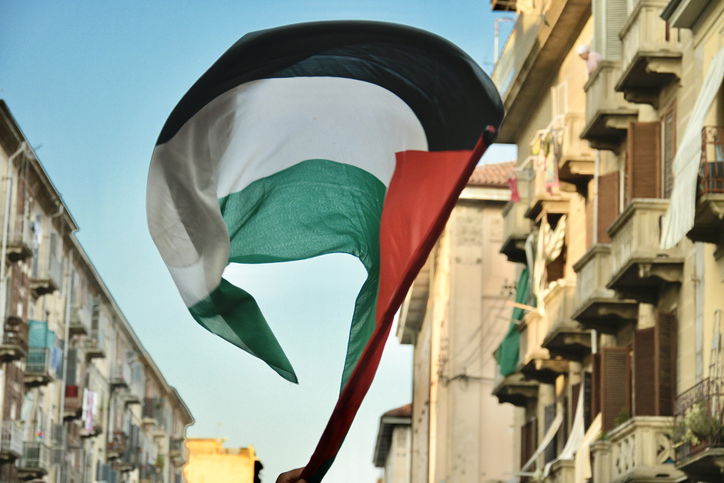
December 19, 2023
Opinion: Black/Palestinian Solidarity Is Rooted In Common Ground
As Black people travel to Gaza and the West Bank, what they find when they arrive are conditions that remind them of their own fight against American racism and second-class treatment.
According to The Associated Press, as Black people travel to Gaza and the West Bank, what they find when they arrive are conditions that remind them of their own fights against American racism and second-class treatment. Deepening this sentiment, as the Ferguson uprising was taking place in 2014 in the wake of the murder of Mike Brown Jr., it was the Palestinian people who instructed Black Americans on how to counter the irritants present in tear gas. Some white Jews worry that this relationship and the negative perception of Israel could strain the good relationship that they cultivated with Black people during the Civil Rights movement, when white Jews got involved in the freedom struggle of Black Americans.
In November, Black American writer and cultural critic Ta-Nehisi Coates told Democracy Now! that what struck him as he traveled in Israel and Palestine for 10 days was the disconnect between how the situation in Palestine was described stateside and his own experience.
“The most shocking thing about my time over there was how uncomplicated it actually is,” Coates said, describing the segregation he witnessed as “evil.” He continued, “There’s no way for me, as an African American, to come back and stand before you, to witness segregation and not say anything about it.” He also said that whatever consequences come his way for vocally supporting the rights of Palestinians, they are not bigger than the circumstances of Palestinians. “I have to measure my fear against the misery that I saw,” he said.
Bob Kaplan, executive director of the Center for Shared Society at the Jewish Community Relations Council, told the AP, “We are concerned, as a community, about what we feel is a lack of understanding of what Israel is about and how deeply Oct. 7 has affected us.”
Kaplan continued, “Antisemitism has to be seen as a reprehensible form of hate … as any form of hate is. Antisemitism is as real to the American Jewish community, and causes as much trauma and fear and upset to the American Jewish community, as racism causes to the Black community, or anti-Asian feeling causes to the Asian community, or anti-Muslim feeling causes in the Muslim community.”
According to a joint Associated Press-NORC Center for Public Affairs Research poll released earlier in December, 44% of Black adults surveyed say that the U.S. is too supportive of Israel, compared to 30% of white and 28% of Latinx respondents. However, they were no more likely than any of the other groups surveyed to say that the U.S. is not supportive enough of Palestine.
In a November op-ed for New Statesman, Chanda Prescod-Weinstein, a Black Jewish scholar, discussed how Zionism is rife with white supremacist logic. She cautioned that Zionism reflects the guiding principles of the Jim Crow system that made Black people experience life as second-class citizens in their own country.
“An ideologically coherent Jewish left must reconsider the stories we have been told about safety, security, and what it means to live without terror. We must take seriously the idea that none of us are free until all of us are free, and to understand that the ‘us’ includes Palestinians,” wrote Prescod-Weinstein.
She concluded, “This means rejecting the supremacist logic of liberal Zionism, that it is possible to build a multicultural sovereign state where Jews are uniquely, legally entitled in ways that others are not. As a black Jew, I find it easy and rather natural to repudiate this premise, which has the same basis as American Jim Crow laws.”
Congresswoman Rashida Tlaib, the only Palestinian American in Congress, found herself at the center of a firestorm over her comments about the Israeli offensive in Gaza. Tlaib faced a censure vote over her defense of the phrase “from the river to the sea.” The phrase, which opponents claim calls for the destruction of Israel and Jewish people, has become the subject of intense political debate.
Tlaib, as reported by Al Jazeera, said that the phrase is not a call for genocide but represents “an aspirational call for freedom, human rights and peaceful coexistence, not death, destruction, or hate.” Despite her clarification, Tlaib was censured in a 234-188 vote, including 22 of her fellow Democrats.
Tlaib believes there should be a distinction between Jewish people and the government of Israel, and that conflating the two results in a dangerous precedent. “It is important to separate people and government,” she said. “The idea that criticizing the government of Israel is antisemitic sets a very dangerous precedent. And it’s been used to silence diverse voices speaking up for human rights across our nation.”
In addition to this, a largely symbolic resolution equating antisemitism with anti-Zionism was passed by the Republican-controlled House of Representatives earlier in December. The resolution, presented by Republicans, also said that “from the river to the sea” was a “rallying cry for the eradication of the State of Israel and the Jewish people.”
Husan Maradja, an organizer for the US Palestinian Community Network, told Al Jazeera he considered the resolution a troubling sign. “It’s super dangerous. It sets a really, really bad precedent. It’s aiming to criminalize our liberation struggle and our call for justice and peace and equality,” Maradja said. “This resolution is saying that if you’re critical of this Israeli government, essentially you hate Jewish people. I didn’t choose — the Palestinians didn’t choose — their occupiers.”
RELATED CONTENT: Former President Obama Weighs In On The Israel-Hamas Conflict